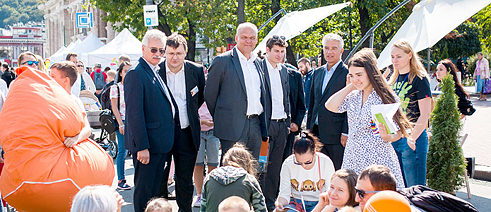German-Ukrainian Year of Languages
The Land of German Learners

Concerts, theatrical performances, summer camps etc, etc, etc ... The German-Ukrainian Year of Languages now opened in Kiev. The choice of this country is no coincidence.
Sometimes the year already begins in September. Or it doesn’t start until September – depending on how you look at it. This is true, say, of the school year in Bavaria, but also of the German-Ukrainian Year of Languages, which just opened in Kiev. For Johannes Ebert, the CEO of the Goethe-Institut, the journey to the opening was a kind of homecoming. From 1997 to 2002, he was the director of the Goethe-Institut in Kiev.
“The Goethe-Institut works on the basis of the friendly relations between Germany and Ukraine, which have grown over the years,” Ebert now said at his former workplace. It can build on a large, nationwide network of cultural societies, reading rooms, language centres, partner schools and partner libraries. Ebert also emphasised the special “Eastern Partnerships” programmes. “With our partners in Ukraine and Germany we are developing platforms where we can negotiate values, encourage reforms and build networks.”
700,000 German learners
German-Ukrainian Year of Languages – if that makes you think about memorising vocabulary and learning grammar, you’re the wrong track. The programme organised by the Federal Foreign Office and the Goethe-Institut is quite entertaining. Concerts, readings, and a literature garden will ensure that it is.It is no coincidence that Ukraine was chosen as the partner country for this Year of Languages. There are few countries where as many people are learning German as in Ukraine: far more than 700,000 people. Only Russia, Poland, France and the UK have more German learners. After English, German is the most important foreign language in Ukraine. Last year, 10,000 Ukrainians attended German courses at the Goethe-Institut and its 13 language learning centres. And that number grows every year.
The Year of Languages began this weekend with an open-air festival on Kontraktova Square, one of the oldest public squares in Kiev. The diversity of the German language was presented with a language and literature garden and there were readings, theatrical performances and a children’s university. The Ukrainian bands Haydamaky and Sergij Zhadan i Sobaki as well as the German bands Kellerkommando and Messer performed. At noon, the largest German lesson was held in Kiev – with 600 in attendance. But the opening was visited by more than 1,500 people.
Basis for the common peace project
The aim of the German-Ukrainian Year of Languages is to expand existing partnerships between educational and cultural institutions in the two countries and to encourage new partnerships and projects. The focus of the Year of Languages is on three topics: What vocational perspectives can the German language offer to young people in Ukraine? How can civil society involvement be strengthened? And in what ways can the German-Ukrainian literary dialogue be advanced, for example by means of translation funding and literary encounters? In short, it’s not about language as an end in itself, but as a basis for the common peace project of European integration.About fifty events are planned from now until the summer of 2018, such as a musical tour, a reading tour with authors, summer camps for pupils, various professional conferences, teacher trainings, youth exchange projects, an exhibition and awards granted for outstanding translators, learners, teachers and publishers. “It’s an ambitious program,” as CEO Ebert admitted. One of its highlights is the video project Refugees Then and Now. In film workshops, pupils from Ukraine, Poland and Germany will deal with human rights issues. Finally, the joint year will end with an international congress on the future perspectives of schools.
The German-Ukrainian Year of Languages was decided in 2016 by the foreign ministers of both countries to promote mutual understanding and friendship twenty-five years after the establishment of diplomatic relations. In the past, Years of Languages have also been organised with other partners, such as China and Russia.